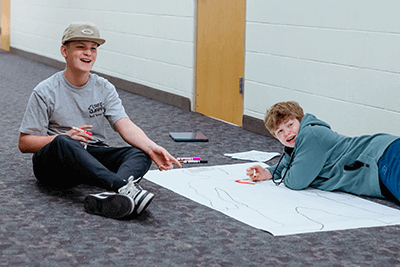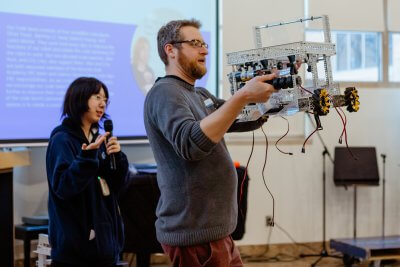January 29, 2026
 from Paul Errickson, Middle School director
from Paul Errickson, Middle School director
As we reach the midpoint of the school year, our division directors are pausing to reflect on what is thriving, what is evolving, and what lies ahead. These updates reflect the unique character of each division and, together, highlight the shared commitment to learning, belonging, and growth that defines Mounds Park Academy. Watch for a state of the school report with a PreK-12 perspective from Dr. Lori-Anne Brogdon, head of school, in next week’s Panther Post.
As I reflect on the year so far, I continue to be inspired by the energy, curiosity, and joy your children bring to Mounds Park Academy’s Middle School each day. Serving 165 students in grades five through eight, our division is a vibrant, student-centered community where intellectual exploration, personal growth, and joyful learning come together in meaningful ways. I’m grateful every day to partner with you as we support the growth of your young adolescents—academically, socially, and emotionally. While it has been a challenging year with a lot going on outside of school, we are so fortunate to have such a safe, inclusive, and joyful school where our middle schoolers can learn and grow.
A Well-Rounded, Engaging Academic Experience
One of the aspects I am most proud of is the richness of our Middle School curriculum. Every student takes art, drama, English, health, math, music, physical education, science, social studies, and world language—every year, in every grade. This ensures that students develop wide-ranging skills and the confidence to try new things. Our concerts and project presentations have been a joy to experience, and our faculty continue to collaborate to create meaningful, authentic experiences for our students.
Our daily structure is intentionally designed to support balance. Students love having a 50-minute lunch and recess period and a 30-minute Flex period, which supports homework completion, clubs, extra help from teachers, and music lessons. This Flex period was restructured and enhanced this year, moving it from the Panther Center to our Family Commons, creating an intentional and productive space and allowing us to add many more clubs. We now have more than 30 extracurricular opportunities—from robotics and sailing to quiz bowl and D&D club! Read More
 from Dr. Lori-Anne Brogdon, head of school
from Dr. Lori-Anne Brogdon, head of school from Paul Errickson, Middle School director
from Paul Errickson, Middle School director Mark your calendars for Friday, April 17, 2026! MPA’s largest and most spirited fundraising event of the year is back, and this time we’re bringing the party to Lowlands in St. Paul!
Mark your calendars for Friday, April 17, 2026! MPA’s largest and most spirited fundraising event of the year is back, and this time we’re bringing the party to Lowlands in St. Paul! from Dr. Lori-Anne Brogdon, head of school
from Dr. Lori-Anne Brogdon, head of school from Paul Errickson, Middle School director
from Paul Errickson, Middle School director We are very excited to announce MPA’s Ski & Snowboard Club for grades seven through 12 at Afton Alps! If 15 students—who don’t already have season passes—sign up, we will be eligible for Ski Club discount tickets. If we can hit our goal, lift tickets will be $39 and rentals will be $37.
We are very excited to announce MPA’s Ski & Snowboard Club for grades seven through 12 at Afton Alps! If 15 students—who don’t already have season passes—sign up, we will be eligible for Ski Club discount tickets. If we can hit our goal, lift tickets will be $39 and rentals will be $37. 
 The MPA SAGE dining team has earned FARECheck Silver certification through FARE-approved Serve It Safely training, a nationally recognized mark of excellence in food allergy awareness and safety.
The MPA SAGE dining team has earned FARECheck Silver certification through FARE-approved Serve It Safely training, a nationally recognized mark of excellence in food allergy awareness and safety.
